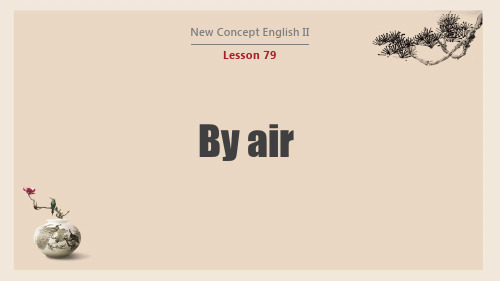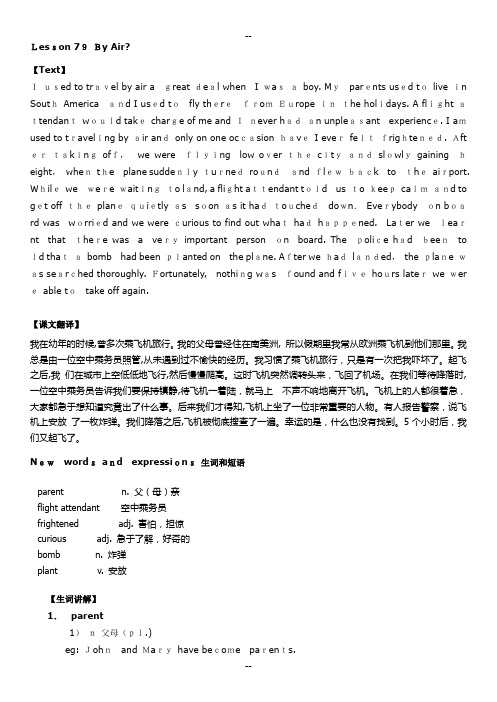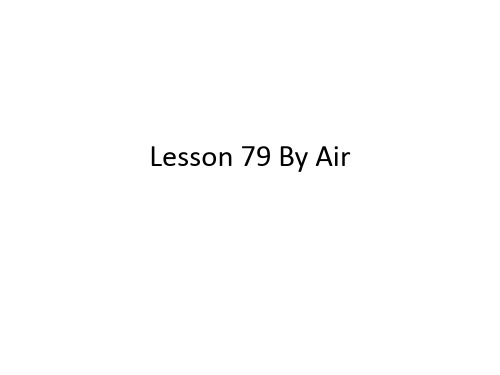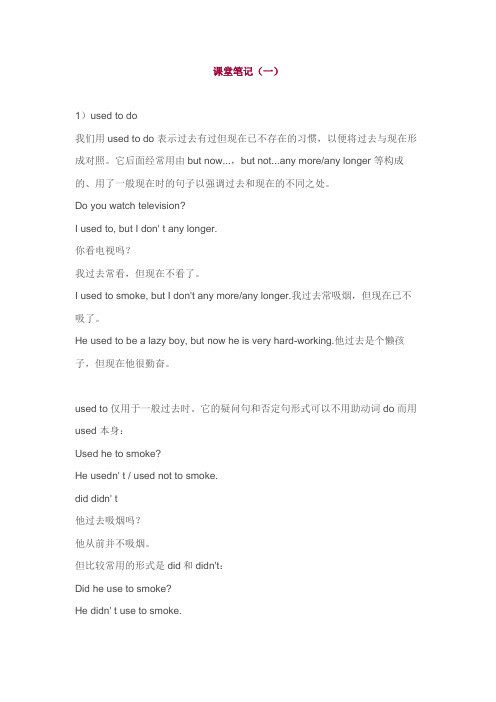79新概念2第79课
每课一句:新概念第2册第79课

每课一句:新概念第2册第79课【往期回顾】每课一句:新概念第2册第78课今天我们接着来看第79课的“每课一句”。
一、课文原文Lesson 79 By airI used to travel by air a great deal when I was a boy. My parents used to live in South America and I used to fly there from Europe in the holidays. A flight attendant would take charge of me and I never had an unpleasant experience. I am used to travelling by air and only on one occasion have I ever felt frightened. After taking off, we were flying low over the city and slowly gaining height, when the plane suddenly turned round and flew back to the airport. While we were waiting to land, a flight attendant told us to keep calm and to get off the plane quietly as soon as it had touched down. Everybody on board was worried and we were curious to find out what had happened. Later we learnt that there was a very important person on board. The police had been told that a bomb had been planted on the plane. After we had landed, the plane was searched thoroughly. Fortunately, nothing was found and five hours later we were able to take off again.——选自《新概念英语》第二册,外语教学与研究出版社,1997年10月第1版二、每课一句I am used to travelling by air and only on one occasionhave I ever felt frightened.注意这句话中的“only on one occasion have I ev er felt frightened”,这是一句倒装句,其原本的正常语序应该是:I have ever felt frightened only on oneoccasion.这句话之所以采用倒装,是因为only on one occasion提到了句首。
【NCE2】新概念英语第二册Lesson 79课件

experience
2.1 Listen, repeat and check.
04 I am used to traveling by air and only on one occasion have I ever felt frightened.
be used to doing on one occasion
tell sb. to do sth.
get off as soon as
2.1 Listen, repeat and check.
07 Everybody on board was worried and we were curious to find out what had happened.
1.3 Check the answers.
Where did your parents use to live?
On South America.
1.3 Check the answers.
What did the plane suddenly do?
It suddenly turned round and flew back to the airport.
be curious to
2.1 Listen, repeat and check.
08 Later we learnt that there was a very important person on board.
on board
2.1 Listen, repeat and check.
09 The police had been told that a bomb had been planted on the plane.
新概念第二册Lesson 79 By air讲义

新概念第二册Lesson 79 By air一、单词精讲parent ['peərənt]n.父(母)亲引申:可引申为根源、起源,如“Necessity is the parent of invention.”(需要是发明之母)。
搭配:single parent(单亲);parent company(母公司);parent - child relationship(亲子关系)。
例句:My parents are very strict with me.(我的父母对我非常严格。
)flightattendant['flait əˌtendənt] 空中乘务员引申:可引申为航空服务人员的代表形象,在航空安全宣传等方面作为一种职业标识。
搭配:experienced flight attendant(有经验的空中乘务员);flight attendant uniform(空中乘务员制服)。
例句:The flight attendant served us delicious meals.(空中乘务员为我们提供了美味的餐食。
)词源:“flight”来自古英语“flyht”,表示飞行;“attendant”源自拉丁语“attendere”,意为照顾、侍候,组合起来表示在空中飞行的飞机上照顾乘客的人员。
frightened['fraitnd]a.害怕,担惊引申:可引申为使人惊恐的状态或氛围,如“a frightened silence”(一种惊恐的沉默)。
搭配:be frightened of(害怕……);frightened look(惊恐的表情)。
例句:The little girl was frightened of the dog.(小女孩害怕那只狗。
)词源:“frighten”源自古英语“fyrhto”,表示恐惧,加上- ed表示形容词形式。
curious['kjuəriəs] a.急于了解,好奇的引申:可引申为奇特的、古怪的,如“a curious object”(一个奇特的物体)。
新概念英语第二册笔记-第79课

--Lesson 79By Air?【Text】Iused to travel by air agreat deal when I wasaboy. Myparents used tolive in SouthAmericaand I used tofly therefromEurope inthe holidays. A flight attendantwould takecharge of me and Inever hadan unpleasant experience. I amused to traveling by air andonly on one occasion haveI everfeltfrightened. Aft ertakingoff,we wereflying low over thecityandslowlygainingheight,whenthe plane suddenly turnedroundand flewback totheairport. Whilewewere waitingto land, a flight attendant told us to keepcalmand to get off theplanequietly as soon as it hadtoucheddown.Everybodyon board was worried and we were curious to find out whathadhappeter welearnt thatthere was a veryimportant personon board. Thepolice hadbeento ld thatabomb had been planted on the plane. After we hadlanded,the plane was searched thoroughly. Fortunately,nothing wasfound and fivehours laterwe wer eable totake off again.【课文翻译】我在幼年的时候,曾多次乘飞机旅行。
新概念英语第二册79课课后习题详细答案(共5篇)

新概念英语第二册79课课后习题详细答案(共5篇)第一篇:新概念英语第二册79课课后习题详细答案新概念英语第二册课后习题答案详解Lesson 79 练习答案 Key to written exercises 1.关键句型练习答案A What happened: never had(1.4);turned round(1.7);flew back(1.7);told(1.8);learnt(1.10);was searched(1.11);was found(1.12);were able to take off(1.12)What was happening: were flying(1.6);and slowly gaining(1.6);were waiting(1.8)What used to/would happen: used to travel(1.1);used to live(1.2);used to fly(1.2);would take charge(1.3)C(sample answers)1 In the past(but not now),I habitually flew there from Europe in the holidays.2 I am accustomed to travelling by air now(because I have done it many times).2.难点练习答案over 2 off 3 in 4 up…up 5 after 6 off 7down 8 off 3.多项选择题答案1.b 根据课文第6-7行,只有b.与课文情形相符合,而其他3个选择都与课文内容不符,所以只能选b.2.d 根据课文第11行,只有d.there was fear of an explosion(爆炸)是课文所暗示的情况,并能说明飞机返回的原因,而其他3个选择虽然都是课文所提及的内容,但不是飞机返回的原因,所以应该选d.3.c e to travel 语法错误;ed to travel 指过去经常性的动作,而本句的时间状语是today,表示现在,因此不能用used to;d.am used to traveling(习惯于旅行)可以表示现在的情况,但与前一句没有逻辑关系,不符合题目意思;只有c.travel 是一般现在时,可以表示现在经常性动作,最符合题目意思和语法,所以选c.4.c 本句需要一个同前一句的a great deal(很多)意义相同的词或词组.a.very many(非常多)只能修饰可数名词,而不能修饰动词.b.a great number(很多)也不能修饰动词.d.lots(很多)常跟of 连用,修饰可数名词.这3个选择都不能替换前一句的a great deal,只有c.a lot 与 a great deal 意思等同,并且可以修饰动词.5.a 本句是一个疑问句,需要一个适合的表示时间的疑问词,以便使它同后面的回答Since I was a boy(自从我幼年时)的意义相吻合。
新概念二册Lesson 79课件(共55张PPT)

I used to travel by air a great deal when I was a boy. My parents used to live in South America and
I used to fly there from Europe in the holidays. used to do
Listening comprehension
• When did you use to travel a great dWeahle?n I was a boy.
• Where did your parents use to liveS?outh Africa.
• When did you use to fly there? In the holidays.
•parent
•n. 父(母)亲
•flight attendant •空中乘务员
•frightened
•adj. 害怕,担惊
•curious
•adj. 急于了解,好奇
•bomb
•n. 炸弹
•plant
•v. 安放
curious adj
frightened adj
Plant n&v
bomb n
Lesson 79 By Air
Check-in desk
• Complete these sentences with a suitable word. • 1 There was a mechanical problem, and we ended up
with a two-hour_______ • 2 Several passengers had to fill in landing ______ • 3 I went through passport control and sat in the
新概念二第79课笔记

课堂笔记(一)1)used to do我们用used to do 表示过去有过但现在已不存在的习惯,以便将过去与现在形成对照。
它后面经常用由but now...,but not...any more/any longer 等构成的、用了一般现在时的句子以强调过去和现在的不同之处。
Do you watch television?I used to, but I don' t any longer.你看电视吗?我过去常看,但现在不看了。
I used to smoke, but I don't any more/any longer.我过去常吸烟,但现在已不吸了。
He used to be a lazy boy, but now he is very hard-working.他过去是个懒孩子,但现在他很勤奋。
used to 仅用于一般过去时。
它的疑问句和否定句形式可以不用助动词do 而用used 本身:Used he to smoke?He usedn' t / used not to smoke.did didn' t他过去吸烟吗?他从前并不吸烟。
但比较常用的形式是did和didn't:Did he use to smoke?He didn' t use to smoke.他过去吸烟吗?他从前不吸烟。
在针对used to提问时,一般也用didI used to be a good swimmer.Did you really? I didn' t even know you could swim.Did you use to smoke?Yes, I did / used to.我过去是个游泳好手。
真的吗?我以前甚至不知道你会游泳。
你从前吸烟吗?是的,我吸。
would 是另一个用于描述过去经常性行为的词,它与used to有时可以互换,有时则不可以,而且would 需要指出具体时间,used to 则不需要。
79新概念2第79课

3. 4. 5. 6. 7.
8.
from next week. am used togetting up early when I started I ________________ working as a baker. You can ease back the stick of the plane and gain height ________________. learn It came as a surprise to ________________ that he had left the company. plant The terrorists ________________ a bomb in the post office. She couldn’t go to school for a few weeks because of an be able to catch up with her illness, but she’ll ________________ lessons quickly. Ground personnel are examining the plane that is going to ________________. take off
- 1、下载文档前请自行甄别文档内容的完整性,平台不提供额外的编辑、内容补充、找答案等附加服务。
- 2、"仅部分预览"的文档,不可在线预览部分如存在完整性等问题,可反馈申请退款(可完整预览的文档不适用该条件!)。
- 3、如文档侵犯您的权益,请联系客服反馈,我们会尽快为您处理(人工客服工作时间:9:00-18:30)。
8.
from next week. am used togetting up early when I started I ________________ working as a baker. You can ease back the stick of the plane and gain height ________________. learn It came as a surprise to ________________ that he had left the company. plant The terrorists ________________ a bomb in the post office. She couldn’t go to school for a few weeks because of an be able to catch up with her illness, but she’ll ________________ lessons quickly. Ground personnel are examining the plane that is going to ________________. take off
would not gogo) with • 1. She told us that she _______(not us,if it rained. • 2. We never imagined that John _______ became (become) a doctor. had worked • 3. He said he _______ (work) in that factory since 1949. been (be) at the bus stop for 20 • 4. Ihad _______ minutes when a bus finally came. was discussing • 5. I _______ (discuss) the trip to Nanjing with my friends when you came back. was making • 6. While Suzy _______ (make) a snowman, Sandy was standing beside her.
1. 2. 3. 4. 5. 6. ['pɛərənt] [flait] :[ə'tendənt] ['fraitnd] frightening ['kjuəriəs] [bɔm] [plɑ:nt]
Listen and answer the questions.
• When did you use to travel by air? • When I was young. • You never had an unpleasant experience did you? • No, I didn’t. • Have you ever felt frightened? • Yes, I have. • You’re used to travelling by air, aren't you? • Yes , I am.
• • • • • • • • • • • • •
【Special Difficulties】 与take有关的短语动词 take off ① 脱下(衣服、鞋子等) Why don’t you take off your coat/hat/glasses? ②(飞机)起飞,(鸟)飞起 The plane will take off in half an hour. ③(嘲弄地)模仿(口语) He takes people off so well he ought to go on the stage. He is always taking his teacher off. =He is always making fun of him by imitating him. take after (长相、性格等)像(父母等) Jane isn’t easy to get along with. She takes after her mother.
• • • • • •
• •
这位青年作家从文学大师的作品中学到了许多东西。 The young writer ________________ learned a lot from the works by masters in literature. 2. 我希望他不会再遭遇到这种不愉快的经历。 I hope he won’t have to undergo _____________________________ so much unpleasant experiences again. 3.有一次爱因斯坦接到一封奇怪的信,这封信的唯一 地址是用铅笔画的爱因斯坦脸的草图。 once ________________ Einstein received a very strange letter whose only address was a pencil sketch of his face. 4.很抱歉,我在这方面毫无经验。 have no experience I am sorry to say that I ________________ in this field.
• 3、After taking off, we were flying low over the city and slowly gaining height, when the plane suddenly turned round and flew back to the airport. • take off 起飞 • gain height (飞机)增加高度,爬高(gain vt. 增加) • The car gained speed when it was outside the town. • He has gained so much weight that he decides to go on a diet. • touch down (飞机)着陆,降落 • Don’t stand up before the plane has touched down. • 4、Everybody on board was worried and we were curious to find out what had happened. • on board 在……(如飞机)上,搭乘(船、飞机、火 车、等) • Tom has never been on board a plane before.
Lesson 79 By air
Do you usually go to some place by air?
Do you have some unpleasant experiences about going by air?
【New words and expressions】
1. 2. 3. 4. 5. 6. parent flight attendant frightened curious bomb plant
be able to, take off, take charge of, be used to (doing), gain height, used to, learn, plant used to smoke, but I don’t any more. 1. I ________________ take charge ofthe company 2. The new manager will ________________
• 2、I am used to travelling by air and only on one occasion have I ever felt frightened. • 用倒装句的情况: • ① 句首为否定或近似否定的副词(never,rarely,little,on no occasion,hardly,no sooner…that等): • Little does he realize how important this meeting is. • Never has he got so many letters. • On no occasion must you accept any money if he offers it. • ② 句首为only构成的词组(如only after,only then 等): • Only then did I realize what a mistake I have made. • Only after she had taken off her coat and hat could I recognize her. • It is only in recent years that it gained bad reputation. 强调 句型 • Only in recent years did the tree gain bad reputation. 倒装 句也表示强调 • be used to doing sth. 习惯于做某事
over • The plane took _____and off flew low _____the When city. _______it was slowly gaining height, it suddenly had____ to return to the airport . Meanwhile __________the passengers were told to After ________calm. ________they had keep disembarked, they learnt that there was a very important person _____board. Someone had on told the police that a bomb had been planted on but ______the plane, _____thought it was later searched, noting was found. Five hours_____, off it took_______ again.
